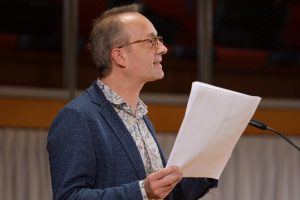The Oriental Question: An Attempt to Reconcile Goethe and Edward Said
14th April 2020
Stefan Weidner
The Oriental Question
An attempt to reconcile Goethe and Edward Said
Abstract
On the face of it, the romantic image of the East presented in Goethe’s West-Eastern Divan and the postcolonial critique of the European view of the East in Edward Said’s principal work Orientalism are difficult to square with one another. In our attempt to bridge the gulf between these two perspectives, we are aided by Goethe’s own conception of a world literature, in which he confronts orientalist clichés and helps us to discover the ‘Orient’ as a multicultural space for the imagination that has a Utopian potential.

No ‘Oriental Question’ can ever be posed innocently. Its beginnings go back to the age of Goethe. There was much talk of ‘The Eastern Question’ in the nineteenth century. It was a question typical of colonialism, and its focus was how to deal with the last great Muslim power, the Ottoman Empire. Though it must be said that in answering this ‘question’, the Ottomans themselves, the forerunners of the Turks of today, played no significant part. They weren’t asked; the European powers resolved the Eastern Question amongst themselves. Indeed, such a question already indicates some measure of distance. Anyone asking it does not entirely belong to the realm under discussion. The Eastern Question, posed by a superior Europe, could therefore only spell trouble for the Orient itself. The nub of the Eastern Question was how the Ottoman Empire, even while it was still a living polity in its own right, could be carved up ‘fairly’ between the major European powers. In some regards, the old Eastern Question survives even today, primarily in the form of the still-unresolved matter of Europe’s relationship with Turkey.
Click here to download the full text, translated by Peter Lewis.
